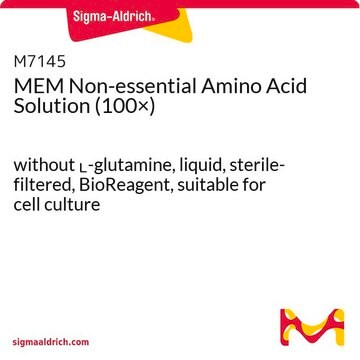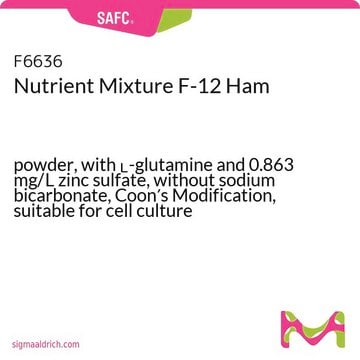N4888
Nutrient Mixture F-12 Ham
With sodium bicarbonate, without ʟ-glutamine, liquid, sterile-filtered, suitable for cell culture
Synonym(s):
Ham’s F-12
About This Item
Recommended Products
product name
Nutrient Mixture F-12 Ham, With sodium bicarbonate, without L-glutamine, liquid, sterile-filtered, suitable for cell culture
Quality Level
sterility
sterile-filtered
form
liquid
technique(s)
cell culture | mammalian: suitable
impurities
endotoxin, tested
components
NaHCO3: yes
sodium pyruvate: 0.11 g/L
phenol red: yes
L-glutamine: no
HEPES: no
shipped in
ambient
storage temp.
2-8°C
Looking for similar products? Visit Product Comparison Guide
General description
Application
- in Minimum Essential Medium to maintain SH-SY5Y human neuroblastoma cells
- to culture female-originated neuroblastoma cells
- to culture primary retinal pigment epithelium (RPE) cells and RPE cell lines
Reconstitution
also commonly purchased with this product
related product
supplement
Storage Class Code
12 - Non Combustible Liquids
WGK
WGK 1
Flash Point(F)
Not applicable
Flash Point(C)
Not applicable
Personal Protective Equipment
Certificates of Analysis (COA)
Search for Certificates of Analysis (COA) by entering the products Lot/Batch Number. Lot and Batch Numbers can be found on a product’s label following the words ‘Lot’ or ‘Batch’.
Already Own This Product?
Find documentation for the products that you have recently purchased in the Document Library.
Customers Also Viewed
Our team of scientists has experience in all areas of research including Life Science, Material Science, Chemical Synthesis, Chromatography, Analytical and many others.
Contact Technical Service





